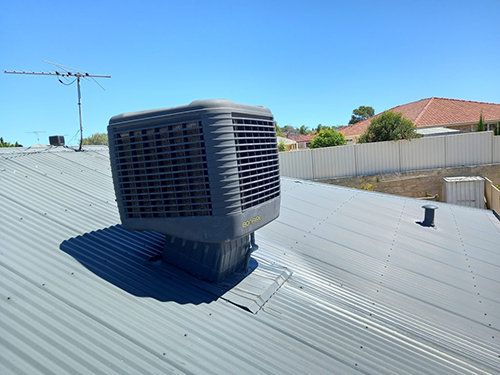
Evaporative Cooling vs. Refrigerated Cooling: What You Need to Know
At Fully Airconditioned, we are not fans of evaporative cooling. While we’ve never installed these systems, we’ve removed hundreds of them over the years. This isn’t to say they’re entirely ineffective—they’re better than no cooling at all—but when compared to refrigerated cooling, there’s simply no contest.
Running Cost Comparison
Is evaporative cooling cheaper to run? The answer isn’t straightforward.
- On a warm day, evaporative systems can perform reasonably well, cycling on and off and potentially costing less to run than refrigerated systems.
- On mildly hot days, however, evaporative coolers must run continuously because the cooling effect stops as soon as the system turns off. In contrast, refrigerated systems remove heat energy from the home, allowing them to cycle on and off (or run at low speed with inverter technology) while maintaining comfort.
- In hot and humid conditions, evaporative cooling struggles to perform. It runs at full capacity but often fails to provide relief when you need it most.
How Evaporative Cooling Works
Heat is energy, and energy cannot simply disappear. Evaporative and refrigerated cooling systems handle heat energy differently:
- Evaporative Cooling: Converts sensible heat into latent heat by drawing warm, dry air across wet media. While this lowers the air temperature, it increases humidity. The heat energy isn’t removed—it’s merely transformed. In fact, the system adds heat to the air through the fan motor, making it function more like a heater than a cooler.
- Refrigerated Cooling: Removes heat energy from the air, reducing both temperature and humidity. This creates a more comfortable environment and allows your body’s natural cooling mechanisms to work effectively.
Relative Humidity and Comfort
Your body cools itself through evaporation—sweating allows moisture to evaporate from your skin, lowering your temperature. However, evaporative cooling saturates the air with moisture, reducing your body’s ability to cool itself and leaving you feeling sticky and uncomfortable. Refrigerated cooling, on the other hand, removes moisture from the air, enhancing your body’s natural cooling process and allowing you to feel comfortable at higher thermostat settings.
Hidden Costs of Evaporative Cooling
- Security Screens and Flyscreens: To function effectively, evaporative coolers require doors and windows to remain open. This often necessitates the installation of security screens and flyscreens, adding $5,000 to your costs.
- Noise Pollution: Open windows mean outside noise—neighbourhood animals, traffic, and other disturbances—can disrupt your sleep and comfort.
- Moisture Issues: Evaporative cooling increases indoor humidity, leading to damp towels, slippery floors, and mould growth on ceilings and walls.
- Ceiling Damage: High humidity can cause gyprock ceilings to sag or become wavy, requiring costly repairs or replacement.
- Heat Loss: Evaporative coolers create significant heat loss through leaky ducts and vents, increasing winter heating costs by 10–20% in some cases.
Risks of Frozen Supply Pipes
In colder climates, evaporative cooling systems pose another significant risk: frozen supply pipes. If the system’s water supply line is not properly drained before winter, the water inside can freeze, causing the pipe to split. This can lead to extensive water damage, including flooding, which can be costly to repair and disruptive to your home. Proper winterization is essential, but even a single oversight can result in severe consequences.
Health Risks: Legionnaires’ Disease
One of the most serious concerns with evaporative cooling systems is the potential risk of Legionnaires’ disease. This is a severe form of pneumonia caused by the Legionella bacteria, which thrives in warm, stagnant water—exactly the conditions found in the water tanks and wet media of evaporative coolers. If the system is not meticulously maintained, bacteria can grow and be dispersed into the air, posing a significant health risk to occupants.
For landlords, the risks are even greater. Failure to properly service and maintain evaporative cooling systems can lead to legal liabilities if tenants are exposed to Legionella bacteria and contract Legionnaires’ disease. Regular cleaning and disinfection are essential, but even with proper maintenance, the potential for contamination remains, making refrigerated cooling a safer and more reliable choice.
Why Refrigerated Cooling is the Better Choice
Refrigerated cooling systems offer superior comfort, efficiency, and reliability. They eliminate the hidden costs, drawbacks, and health risks of evaporative cooling, providing consistent performance in all weather conditions. While some appreciate the “fresh air” effect of evaporative cooling, it’s worth noting that refrigerated systems can also operate with windows or doors open—albeit less efficiently.